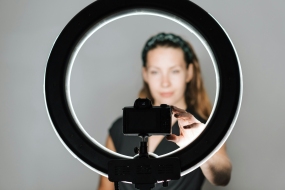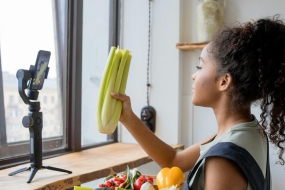As influencer marketing continues to grow, artificial intelligence (AI) is playing an increasingly critical role in optimizing campaigns, improving targeting, and enhancing overall efficiency.
What was once a manual, time-consuming process - finding the right influencers, managing campaigns, and tracking ROI—has now been streamlined by AI technology. From influencer identification and content performance analysis to automating communication and predicting campaign success, AI is revolutionizing how brands approach influencer marketing. This article delves into the many ways AI is changing the game, making influencer marketing more data-driven and scalable.
1. AI-Powered Influencer Identification: Finding the Perfect Match
One of the most challenging aspects of influencer marketing is identifying the right influencers who align with a brand’s values, target audience, and goals. AI is transforming this process by using algorithms to analyze vast amounts of data to help marketers find influencers who are the best fit for their campaigns.
- Audience analysis: AI tools can analyze an influencer's followers to determine their demographics, interests, location, and engagement levels. This enables brands to match influencers with audiences that mirror their ideal customer profiles, ensuring more effective campaigns.
- Sentiment analysis: Beyond just audience size or engagement rates, AI can evaluate the sentiment of an influencer’s content. It can assess whether the influencer typically evokes positive, neutral, or negative emotions from their audience, helping brands avoid influencers who might have controversial or risky reputations.
Key Takeaway: AI makes influencer identification more accurate and data-driven by evaluating not only audience demographics but also content quality and sentiment.
2. Campaign Management and Optimization with AI
Running a successful influencer marketing campaign involves juggling multiple tasks, from coordinating with influencers to analyzing real-time performance. AI is streamlining these processes by automating key functions and providing real-time insights to optimize campaigns on the go.
- Automated campaign management: AI tools can help manage communication between brands and influencers, automating tasks like briefing, content approval, and payment processing. This saves time and ensures smoother collaboration.
- Dynamic content optimization: AI can monitor influencer campaigns in real time, analyzing how posts are performing based on factors like engagement, reach, and conversions. Using this data, AI can suggest adjustments to campaign strategy, such as changing posting times, tweaking messaging, or amplifying content through paid promotion.
- Predictive analytics: AI can analyze historical campaign data to predict future performance. It can recommend the best influencers, content types, and posting schedules based on patterns in past data, increasing the likelihood of campaign success.
Key Takeaway: AI enhances campaign management by automating routine tasks and optimizing content in real time, ensuring higher efficiency and effectiveness.
3. AI-Driven Content Creation and Personalization
Another significant area where AI is making its mark is in content creation and personalization. AI algorithms are helping brands and influencers tailor their messaging to specific audiences, ensuring that content resonates on a deeper level and drives engagement.
- Personalized content recommendations: AI can analyze consumer behavior to recommend personalized content ideas to influencers, making their posts more relevant to their audience. By understanding what types of posts resonate most with an influencer’s followers, AI helps craft more engaging and effective content.
- Automated content generation: AI tools can also assist in creating content such as captions, hashtags, and even product descriptions. While the creative aspect of influencer marketing still requires a human touch, AI can enhance it by providing data-driven insights and suggestions to make content more impactful.
Key Takeaway: AI-driven content personalization ensures that influencer posts are more relevant and engaging, making campaigns more targeted and impactful.
4. Enhanced ROI Tracking and Performance Measurement
Measuring the return on investment (ROI) of influencer marketing campaigns has always been challenging, but AI is transforming how brands track and quantify their results. With AI, marketers can better understand the impact of their influencer efforts in real time and make data-driven decisions.
- Advanced attribution models: AI-powered tools offer advanced attribution models that can more accurately track how influencer content contributes to conversions, sales, or brand awareness. These models can analyze user journeys across platforms to see how and when influencer posts influence consumer decisions.
- Real-time performance tracking: AI enables real-time analysis of key performance indicators (KPIs) such as engagement, reach, clicks, and conversions. This immediate feedback allows brands to make adjustments mid-campaign, improving overall performance.
- Predictive ROI analysis: Using historical data, AI can predict the potential ROI of an influencer campaign before it even launches. This allows brands to allocate their budgets more effectively, focusing on influencers and strategies that are more likely to deliver high returns.
Key Takeaway: AI provides brands with advanced tools for tracking influencer marketing ROI, offering real-time insights and predictive analytics to make campaigns more effective and measurable.
5. Fraud Detection and Audience Authenticity Verification
One of the challenges in influencer marketing is ensuring that the influencers’ audiences are genuine. AI plays a crucial role in detecting fraudulent activity, such as fake followers or engagement, which can mislead brands into overpaying for ineffective campaigns.
- Fake follower detection: AI tools can analyze follower patterns and engagement rates to detect suspicious activity, such as spikes in followers that may indicate the use of bots or purchased followers. This ensures that brands only collaborate with influencers who have authentic, engaged audiences.
- Engagement authenticity: AI can evaluate engagement metrics, such as likes, comments, and shares, to determine whether an influencer’s audience is genuinely interacting with their content or if the engagement is inflated through artificial means. This helps brands avoid partnerships with influencers who might artificially boost their engagement numbers.
Key Takeaway: AI tools help brands verify the authenticity of an influencer’s audience, protecting them from fraudulent activity and ensuring that their marketing budgets are well spent.
6. AI and Influencer Discovery Platforms
AI is the backbone of many influencer marketing platforms, offering brands sophisticated search and discovery tools. These platforms use AI algorithms to scan and analyze millions of influencer profiles across social media, helping brands quickly identify the right partners based on specific criteria.
- Advanced filtering: AI-driven platforms allow brands to filter influencers based on numerous variables, such as follower count, engagement rate, audience demographics, and niche focus. This helps marketers narrow down their search to find the perfect match for their campaign objectives.
- Social listening and trend analysis: AI-powered tools also enable brands to conduct social listening, tracking conversations and trends across social media. This helps brands identify rising influencers who are gaining traction in specific niches, allowing them to act quickly and secure partnerships with up-and-coming personalities.
Key Takeaway: AI-powered influencer discovery platforms offer brands highly targeted search capabilities, making it easier to find influencers who align with their goals and audience.
7. The Future of AI in Influencer Marketing
Looking ahead, AI’s role in influencer marketing will only expand as technology becomes more sophisticated. We can expect to see further advancements in personalization, predictive analytics, and even influencer-generated content.
- AI-generated influencers: Virtual influencers—digital characters powered by AI—are becoming a new phenomenon. These influencers don’t exist in real life but have a growing presence on social media, offering brands a new type of partnership opportunity. While still in its early stages, AI-generated influencers could become a mainstream option in the near future.
- Hyper-personalization: As AI continues to refine its ability to analyze consumer data, influencer content will become even more personalized, tailored to specific preferences, behaviors, and purchase histories. This will enhance the relevance and effectiveness of campaigns, driving stronger engagement and conversions.
Key Takeaway: AI will continue to revolutionize influencer marketing by enabling hyper-personalization, advanced predictive analytics, and even virtual influencers, making the industry more innovative and data-driven.
Conclusion
AI is revolutionizing every aspect of influencer marketing, from identifying the perfect influencers and optimizing campaigns to tracking ROI and preventing fraud. As AI technology continues to evolve, it will only become more integral to influencer marketing strategies, allowing brands to create more targeted, efficient, and impactful campaigns. Brands that embrace AI-driven tools will be better equipped to navigate the complexities of influencer marketing, ultimately achieving greater success in this rapidly changing landscape.









